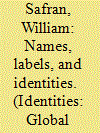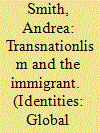| Srl | Item |
| 1 |
ID:
084958


|
|
|
|
|
| Publication |
2008.
|
| Summary/Abstract |
This article adds to Richard Wilk's work on the emergence of "global structures of common difference," that organize diversity through objectification of culture. Using cases from an Aotearoa/New Zealand school in 1997-1998, this article reveals a limit to the hegemony of global structures of common difference in daily life. By focusing on the indigenous M ori culture and newly arrived Asian's culture, this article shows (1) how variously positioned individuals did not necessarily subscribe to global structures of common difference-defying, evading, critiquing, ignoring, and circumventing them-and (2) to what degrees people objectified cultural differences and with what effects when global structures of common difference shaped cultural differences.
|
|
|
|
|
|
|
|
|
|
|
|
|
|
|
|
| 2 |
ID:
084959


|
|
|
|
|
| Publication |
2008.
|
| Summary/Abstract |
This article addresses a relatively unexplored topic: the meaning and use of names and labels for ethnies and nations. It has been said (by Anthony Smith and others) that a nation is a "named" ethnic community. In the same sense, an ethnie is a "named" categoric group. The labeling of an ethnic or national categoric group by the group is often a self-conscious political act of identification reflecting its image and self-image and serving a variety of purposes: the achievement of collective self-respect, self-legitimation, adaptation and assimilation, differentiation, and self-exclusion, just as labeling by others is associated with legitimation or de-legitimation and positive or negative discrimination. The assigning of ethnonyms is a function of the sociopolitical context, ideology, and public policy.
|
|
|
|
|
|
|
|
|
|
|
|
|
|
|
|
| 3 |
ID:
084957


|
|
|
|
|
| Publication |
2008.
|
| Summary/Abstract |
This research was conducted in an informal school located in Thailand at the border with Myanmar (Burma) and supervised by the Karen National Union (KNU). The KNU has claimed and fought for political autonomy and independence from the Burmese government for more than a half century. The authors examine how, in their narratives about what it means to be Karen, future Karen leaders try to deal with challenges to a sense of Karen unity and "groupness," and to the legitimacy of the Karen struggle. One important challenge is the substantial cultural, religious, linguistic, and geographical internal diversity. Establishing a coherent Karen identity among the different subgroups is a continuing struggle for Karen leaders. Another is the negative labeling of the KNU as stubborn people and violent terrorists. These labels endanger the political project, the international reputation, and the local attractiveness of the KNU.
|
|
|
|
|
|
|
|
|
|
|
|
|
|
|
|
| 4 |
ID:
084960


|
|
|